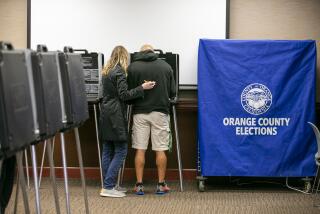A judicious opinion on Pennsylvania’s silly voter ID law
As someone who writes a lot about court decisions, I can vouch for the fact that actually reading the opinions can spoil the fun. A court’s rationale is often more complicated and technical than the first takeaway from the decision would suggest. Sometimes, it’s true, the jurisprudential rigmarole is just a rationalization for an outcome-driven discussion, but that happens less often than cynics think.
I offer these observations to explain why I’m less outraged than some people about a Pennsylvania judge’s refusal to block implementation of that state’s voter ID law -- a law, I think, that is mischievous and politically motivated. Commonwealth Court Judge Robert Simpson’s opinion is closely reasoned, careful (perhaps too careful; see below) and as far as I can see untainted by partisanship, though he was elected as a Republican.
We all know that Pennsylvania’s Republican Legislature approved the voter ID law with no evidence that in-person voter impersonation was a serious problem in my home state. And a lot of us can recite by heart this boast from a Republican politico: “Voter ID, which is going to allow Governor Romney to win the state of Pennsylvania: Done!” (Simpson termed those comments by House Majority Leader Michael Turzai “disturbing, tendentious.”)
Simpson made several points in his opinion. (Here’s a good cheat sheet.) But the decision turned in large part on these issues, which of course some would dismiss as legal technicalities:
1) The plaintiffs were seeking to stop the law from being implemented, and there are venerable rules governing the issuing of injunctions, including a requirement that those seeking an injunction show that they are likely to prevail on the merits.
2) The challenge was a so-called facial challenge -- an argument that the law was unconstitutional on its face, not as it was applied to particular individuals. (Somewhat plaintively, Simpson writes: “The difference between a facial challenge and an ‘as applied’ challenge is an important legal distinction unknown to lay persons. Indeed, it is not fully appreciated by many legal professionals, save for the avid constitutional scholars.”) Simpson cited a rule that a law should be struck down on its face only if there were “no set of circumstances under which the act would be valid.” That’s a high bar.
3) Finally, Simpson said that -- notwithstanding Turzai’s “tendentious” comments -- the court owed deference to the Legislature’s asserted interest in protecting public confidence in the integrity of elections. Simpson, citing federal and state precedents, said he would not submit the law to “strict scrutiny,” the most exacting level of judicial review. Had he done so -- and I think the case for strict scrutiny was a good one, given the fundamental nature of the right to vote -- the plaintiffs might have prevailed.
That said, I have some sympathy for Simpson, the sort of sympathy a lot of conservatives refused to show Chief Justice John G. Roberts Jr. after his vote to uphold President Obama’s healthcare law. In a democracy, courts need to be careful about overturning the enactments of a popularly elected legislature. Maybe Simpson was too careful here -- the state Supreme Court could reverse him -- but those who would dismiss his opinion as a partisan hatchet job should read it first.
ALSO:
Affirming affirmative action
Science, such a sweet mystery
Gay rights and a D.C. shooting: Don’t play the blame game
More to Read
A cure for the common opinion
Get thought-provoking perspectives with our weekly newsletter.
You may occasionally receive promotional content from the Los Angeles Times.







